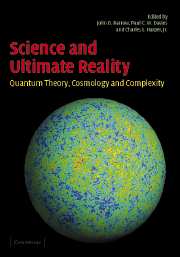Book contents
- Frontmatter
- Contents
- List of contributors
- Foreword
- Editors' preface
- Preface
- Acknowledgments
- Part I An overview of the contributions of John Archibald Wheeler
- Part II An historian's tribute to John Archibald Wheeler and scientific speculation through the ages
- Part III Quantum reality: theory
- Part IV Quantum reality: experiment
- 11 Why the quantum? “It” from “bit”? A participatory universe? Three far-reaching challenges from John Archibald Wheeler and their relation to experiment
- 12 Speakable and unspeakable, past and future
- 13 Conceptual tensions between quantum mechanics and general relativity: are there experimental consequences?
- 14 Breeding nonlocal Schrödinger cats: a thought-experiment to explore the quantum–classical boundary
- 15 Quantum erasing the nature of reality: or, perhaps, the reality of nature?
- 16 Quantum feedback and the quantum–classical transition
- 17 What quantum computers may tell us about quantum mechanics
- Part V Big questions in cosmology
- Part VI Emergence, life, and related topics
- Appendix A Science and Ultimate Reality Program Committees
- Appendix B Young Researchers Competition in honor of John Archibald Wheeler for physics graduate students, postdoctoral fellows, and young faculty
- Index
11 - Why the quantum? “It” from “bit”? A participatory universe? Three far-reaching challenges from John Archibald Wheeler and their relation to experiment
from Part IV - Quantum reality: experiment
Published online by Cambridge University Press: 29 March 2011
- Frontmatter
- Contents
- List of contributors
- Foreword
- Editors' preface
- Preface
- Acknowledgments
- Part I An overview of the contributions of John Archibald Wheeler
- Part II An historian's tribute to John Archibald Wheeler and scientific speculation through the ages
- Part III Quantum reality: theory
- Part IV Quantum reality: experiment
- 11 Why the quantum? “It” from “bit”? A participatory universe? Three far-reaching challenges from John Archibald Wheeler and their relation to experiment
- 12 Speakable and unspeakable, past and future
- 13 Conceptual tensions between quantum mechanics and general relativity: are there experimental consequences?
- 14 Breeding nonlocal Schrödinger cats: a thought-experiment to explore the quantum–classical boundary
- 15 Quantum erasing the nature of reality: or, perhaps, the reality of nature?
- 16 Quantum feedback and the quantum–classical transition
- 17 What quantum computers may tell us about quantum mechanics
- Part V Big questions in cosmology
- Part VI Emergence, life, and related topics
- Appendix A Science and Ultimate Reality Program Committees
- Appendix B Young Researchers Competition in honor of John Archibald Wheeler for physics graduate students, postdoctoral fellows, and young faculty
- Index
Summary
Introduction
First a word of thanks. When I first came across the papers of John Archibald Wheeler on the foundations of quantum mechanics, most of them reprinted in Wheeler and Zurek (1983), I could not believe what I read. Finally here was a colleague of worldwide reputation, given his many contributions to theoretical physics, who was not afraid to discuss openly the conceptual problems of quantum mechanics. The outstanding feature of Professor Wheeler's viewpoint is his realization that the implications of quantum mechanics are so far-reaching that they require a completely novel approach in our view of reality and in the way we see our role in the universe. This distinguishes him from many others who in one way or another tried to save pre-quantum viewpoints, particularly the obviously wrong notion of a reality independent of us.
Particularly remarkable is Professor Wheeler's austerity in thinking. He tries to use as few concepts as possible and to build on this the whole of physics. A fascinating case in point is the title of one of his papers “Law without law,” the attempt to arrive at the laws of nature without assuming any law a priori.
For me personally his work on fundamental issues in quantum mechanics has been particularly inspiring. The questions he raises are exceptionally far-reaching and some of his concepts in the foundations of physics are so radical that calling them revolutionary would not do them justice.
Information
- Type
- Chapter
- Information
- Science and Ultimate RealityQuantum Theory, Cosmology, and Complexity, pp. 201 - 220Publisher: Cambridge University PressPrint publication year: 2004
Accessibility standard: Unknown
Why this information is here
This section outlines the accessibility features of this content - including support for screen readers, full keyboard navigation and high-contrast display options. This may not be relevant for you.Accessibility Information
- 47
- Cited by
